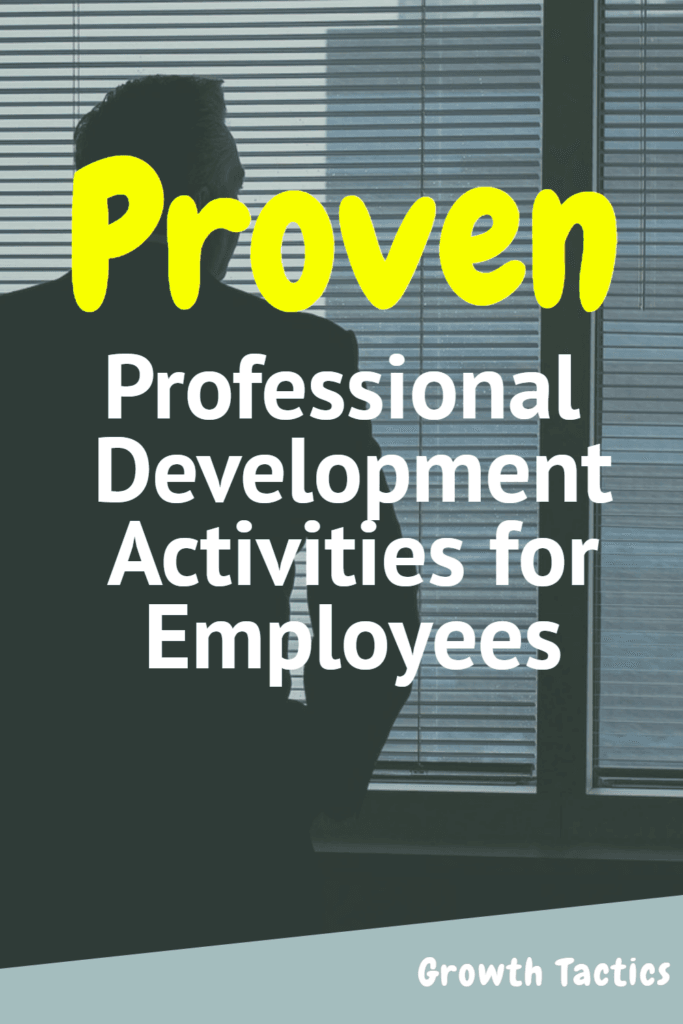As leaders and managers, it’s our duty to guide our employees toward achieving their potential and unlocking it. You are the catalyst for their growth, and with purpose-driven development activities, you can transform your team into a powerhouse of innovation and productivity.
Jump To Section
The Importance of Employee Development
When we invest in employee development, we pave the way for organizational success. Development activities for employees operate on the same principles. They ensure team members are equipped with the necessary skills, confidence, and motivation to excel.
Development isn’t just about enhancing skills; it’s about nurturing potential. It’s the difference between a good team and a great one. By prioritizing individual growth and collective development, we build a resilient workforce ready to tackle any challenge.
Individual Development Ideas: A Blueprint for Purposeful Growth
In the dynamic world of leadership and personal growth, the cornerstone remains individual development. Recognizing that each member of your team brings distinctive strengths and areas ripe for improvement is indispensable. By tailoring development activities, you not only nurture potential but also fortify the foundation of a purpose-driven team. Let’s delve deeper into the strategies that can catalyze this transformative journey.
Personalized Learning Plans
Begin by defining individual goals. Pinpoint the specific aspirations and interests of every team member. Understand what drives them, where their passions lie, and what competencies they wish to enhance.
Next, craft customized learning pathways. Design personalized training programs that encompass a variety of resources, such as online courses, workshops, seminars, and pertinent reading materials. The key here is to align these resources with the individual’s aspirations.
Example: Jane, a marketing coordinator, exhibits a keen interest in data analytics. Enroll her in a relevant course and ensure she has designated time to implement her newfound knowledge in her daily responsibilities.
Mentorship Programs
Build a mentorship culture where guidance and support are cornerstones. Pair seasoned employees with newcomers to forge relationships based on shared knowledge. This not only facilitates learning but also strengthens bonds within the team.
Develop structured mentorship processes. Ensure it’s not just a casual endeavor but a meaningful interaction with scheduled meetings and defined goals.
Example: Connect a senior project manager with a junior associate to impart wisdom, share project-management techniques, and provide career mentoring, ultimately fostering a culture of continuous learning.
Cross-Training Development Opportunities
Expand horizons through cross-training. Encourage team members to venture into different departments or roles periodically. This broadens their skillset and engenders a comprehensive understanding of the organization’s operations.
Facilitate knowledge transfer. By immersing in diverse roles, employees gain a holistic perspective of business processes, which is instrumental in enhancing their problem-solving abilities, operational acumen, and overall career development.
Example: Assign a customer service representative a stint with the product development team. This experience will offer them invaluable insights into the product lifecycle, enriching their customer service expertise with first-hand product knowledge.
As leaders, it’s our duty to champion individual growth through purposeful and empathetic action. By implementing these strategies, you lay the groundwork for a team that is not only skilled but also deeply aligned with the organizational mission.
Remember, true leadership goes beyond managing tasks; it’s about nurturing people’s professional growth and development, unlocking their fullest potential. Let’s lead with purpose and passion, creating pathways that encourage each team member to find and fulfill their unique roles.
Team-Based Professional Development Activities: Fostering Cohesion and Collaboration
Team cohesion and collaboration are the bedrock of any successful organization. It’s through the strength of a united team that we achieve monumental goals and drive innovation.
Purpose-driven, team-based development activities play a crucial role in fostering these attributes, pushing each team member to realize their potential while contributing to a shared vision. Let’s delve into some effective strategies that can bolster these critical elements.
Team-Building Exercises
Organizing team-building exercises isn’t just about having fun, it’s about building a solid foundation of trust and camaraderie. Whether it’s an adrenaline-pumping escape room challenge or a serene outdoor adventure, these activities are designed to encourage teamwork and communication.
Example: Quarterly Team-Building Events
Scenario: Host a quarterly team-building event where employees are required to solve challenges together. One quarter, you might take your team to an escape room where employee engagement, collaboration, and quick thinking are essential to solving puzzles. Another quarter could involve an outdoor adventure, like a ropes course, that requires mutual support and trust.
Impact: Such activities help break down silos, foster a sense of unity and cooperation, and build stronger interpersonal relationships. Remember, these experiences are about more than just the activity, they are about creating lasting bonds and a spirit of camaraderie.
Collaborative Projects
Encourage cross-departmental projects that necessitate diverse skill sets. When members from different departments collaborate, they bring a variety of perspectives to the table, fostering innovation and a more holistic approach to problem-solving.
Example: Cross-Functional Product Development
Scenario: Launch a project involving members from marketing, sales, and product development. The objective could be to brainstorm and implement a new product feature.
Each department brings its unique expertise and viewpoint. The marketing team understands customer desires, the sales team knows market trends, and the product development team can gauge feasibility and technical constraints.
Impact: This kind of collaboration not only promotes teamwork but also sparks innovation. When diverse minds come together, the results are often groundbreaking ideas that can propel the organization forward.
Workshops and Webinars
Regularly scheduled workshops and webinars can be instrumental in keeping your team abreast of the latest industry trends, tools, and best practices. These sessions often provide fresh insights and inspire new ideas, helping the team stay ahead of the curve.
Example: Industry Expert Webinars
Scenario: Invite a guest speaker to conduct a webinar on emerging trends and their potential impact on your business. For instance, bringing in an expert to discuss the implications of new AI technologies could provide invaluable insights for your tech and strategy teams.
Impact: These workshops and webinars are not just learning opportunities, they are chances to inspire and ignite curiosity. By exposing your team to external expertise, you expand their horizons and motivate them to think outside the box.
Purpose-Driven Implementation
Each of these activities should be aligned with a clear purpose and goal. It’s not about ticking the box on team-building but about genuinely enhancing the dynamics, trust, and cooperation within your teams.
Drawing from Air Force and leadership experiences, remember that the mission is paramount, but the people who execute that mission are your greatest asset. Empower them with activities that matter, that enrich their skills and perspectives, and you’ll see the results ripple across your organization.
Purpose-Driven Development: Fueling Engagement and Productivity
In any thriving organization, the connection between individual roles and the broader mission is what truly ignites passion and productivity.
Purpose-driven development activities are paramount in aligning personal aspirations with overarching organizational goals.
This alignment not only inspires and motivates employees but also leads to a more engaged and efficient workforce. Let’s take a look at how to cultivate this through targeted development activities.
Goal-Setting Sessions
Structured goal-setting is more than a routine, it’s a powerful instrument for channeling individual effort toward collective success. Facilitating goal-setting sessions allows employees to define meaningful and achievable targets that resonate with both their personal ambitions and the organizational mission.
Example: Quarterly Goal-Setting
Scenario: Conduct quarterly sessions where employees are encouraged to outline their personal and professional goals. This involves a dual-focus discussion: first, identifying what personal achievements they seek, and second, how these aspirations align with the team’s overall objectives.
Impact: This regular exercise not only ensures clarity but also fosters a deeper sense of ownership and commitment. When employees see how their individual goals dovetail with the team’s objectives, it creates a cohesive drive toward shared success. This balance between personal growth and teamwork is where real progress happens.
Vision and Mission Alignment Exercises
To ensure the sustainability of purpose-driven development, it’s essential to continuously revisit and realign with the company’s vision and mission. Regular reviews provide clarity and reaffirm the collective purpose, reminding everyone of their crucial role in the bigger picture.
Example: Bi-Annual Vision and Mission Reflections
Scenario: Hold bi-annual meetings specifically designed for teams to reflect on their past contributions and strategize how their upcoming projects will align with the company’s vision. During these sessions, encourage open dialogue about the relevance of the company’s mission and how each individual’s work supports these broader goals.
Impact: These sessions do more than just clarify duties, they build a bridge of understanding and commitment. By continuously aligning individual output with corporate vision, employees feel more connected, valued, and driven to excel. It’s a reminder that every cog in the machine has a purpose, and every effort counts.
People First, Always
At the heart of these activities is a simple yet powerful belief: people first. Each individual’s contributions, when aligned and driven by purpose, lead to a dynamic and high-performing team.
Encourage your team to set their own paths, find their motivations, and understand the significance of their roles. By fostering this environment, you’re not just building a team, you’re nurturing leaders, innovators, and problem-solvers.
Practical Tips for Implementation: Turning Vision into Action
Implementing development activities for employees is no small feat; it requires strategic planning, an unwavering commitment to continuous feedback, and a readiness to adapt. It’s about cultivating an environment where each individual feels heard, valued, and empowered to contribute meaningfully. Here’s how to practically bring this vision to life while prioritizing people and purpose.
Needs Assessment: Laying the Groundwork
Understanding what your team truly needs is the cornerstone of effective development. Without a clear sense of where your team stands and what they require, efforts can easily become misaligned with actual needs. Start with a thorough assessment to paint an accurate picture of your team’s landscape.
Anonymous surveys can be a powerful tool to gather honest and unfiltered feedback on development needs. This method encourages transparency and authenticity, ensuring that you gather genuine insights into areas that require attention.
Resource Allocation: Equipping for Success
Once you’ve identified needs, the next step is to ensure that the necessary resources, time, budget, and tools, are in place. Effective resource allocation is the backbone of any successful development program.
Allocating specific hours within workweeks dedicated solely to training and development activities is a practical approach. Whether it’s through workshops, online courses, or peer-led sessions, these designated times ensure that development is prioritized and not relegated to the sidelines.
Monitor and Adapt: Navigating the Development Journey
The landscape of professional development is ever-evolving, influenced by new challenges and emerging needs in the workplace. Continuous monitoring and a willingness to adapt are crucial for maintaining the relevance and effectiveness of your initiatives.
Implementing quarterly reviews to assess the impact of your developmental activities is essential. Gather feedback, analyze outcomes, and be prepared to make necessary adjustments. This iterative process ensures that your programs remain aligned with evolving team needs.
Conclusion
Unlocking the potential within your team requires purposeful action and dedicated effort. By integrating proven development activities tailored to individual and team needs, you not only enhance skills but also inspire a culture of continuous growth and engagement. Remember, it’s about progress with purpose. Take the first step today and watch your team flourish into a powerhouse of innovation and productivity.


